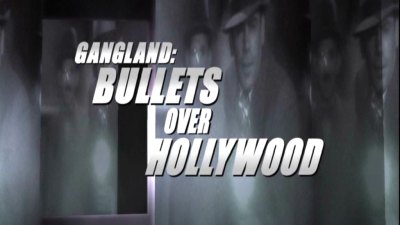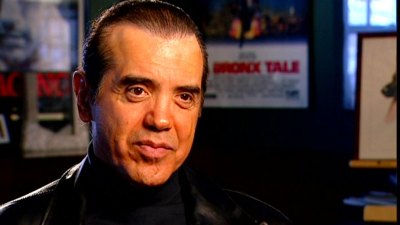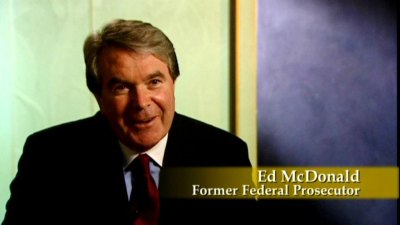| Reviews & Columns |
|
Reviews DVD TV on DVD Blu-ray 4K UHD International DVDs In Theaters Reviews by Studio Video Games Features Collector Series DVDs Easter Egg Database Interviews DVD Talk Radio Feature Articles Columns Anime Talk DVD Savant Horror DVDs The M.O.D. Squad Art House HD Talk Silent DVD
|
DVD Talk Forum |
|
|
| Resources |
|
DVD Price Search Customer Service #'s RCE Info Links |
|
Columns
|
|
|
Gangland: Bullets Over Hollywood
Based on John McCarty's tome Bullets Over Hollywood: The American Gangster Picture from the Silents to "The Sopranos,", director Elaina Archer's Gangland: Bullets Over Hollywood is a well-meaning documentary on the influence of Hollywood gangster films, that unfortunately is critically hampered by its brevity. Running just a scant 70 minutes, Gangland: Bullets Over Hollywood, produced by Hugh Hefner for the Encore Network, suffers from an abbreviated, compressed approach to this huge film history subject, offering little more than generalities rather than meaningful insights. Utilizing film clips from famous gangster movies, while interspersing interviews with actors and movie critics, Gangland: Bullets Over Hollywood tries not only to trace the entire history of the gangster film, but also time lines and commentaries on the immigrant experience in America, and the history of U.S. organized crime. Clearly, those are three massive subjects that even three separate documentaries would have a hard time comprehensively covering, but Gangland: Bullets Over Hollywood attempts to illuminate all of them - and fails.

Director Archer obviously has a feel for the material. It's clear that in her screenplay co-written by Tom Marksbury, Archer has thought out some of the major themes that permeate most gangster films, while touching on sociological and political trends that run through America's history concurrent with the film genre. Unfortunately, that's all that Archer is able to do: touch on them. Just when one interesting tangent is brought up (sometimes, literally, with just one sentence), it's immediately dropped with no further discussion, and we're off to the next generality. A case in point comes when film critic and historian Leonard Maltin (who comes off well here, as he always does) brings up director Brian De Palma's remake of the Howard Hawks classic, Scarface. With one sentence, Maltin ponders the irony of De Palma creating a film that has greatly driven and influenced the noxious "gangsta" subculture. However, that's all you get in Gangland: Bullets Over Hollywood on this particular subject: one sentence. No further exploration; no elaboration. Just one sentence on a subject that could be the basis for ten documentaries. As well, the contextual reference points are vague, at best. If you're a hard-core film fan, or into the "gangsta" subtext, you already know how De Palma's film has been perverted and twisted into some kind of cultural beacon for cretins. But as a casual viewer watching Gangland: Bullets Over Hollywood, with little background in the subject, you won't understand the import of Maltin's statement -- and Archer isn't going to guide you through it.
Fueling Archer's generalized coverage are bromides and cliches delivered by the interviewed subjects. Although certainly charismatic, thoughtful, and well-spoken, actors like James Caan and Fred Williamson are hardly experts on the subject of crime in America. When Caan actually suggests that infamous gangster Meyer Lansky is the hero of corporate and academic America, and Williamson suggests that 1930s gangsters weren't hurting anybody but the government (and therefore, were heroes to the people precisely because of that rebellion), we know we're in for some whoppers. And there are plenty of them throughout the documentary. Old canards include: Wall Street operating the same as gangsters (that may be true, but we don't idolize them anymore than we do "common" criminals); Irish, Jewish, and Italian immigrants had little opportunities when they came to America, so they rightfully turned to crime to get ahead (a disgusting fallacy that insults the vast majority of turn-of-the-century immigrants who kept their noses clean - precisely because there were a wealth of opportunities); gangsters beat the corrupt "System" and thus deserve to be cultural heroes (another disreputable excuse for breaking the law); and that the American public loves a criminal (the media loves a criminal - because it sells papers and drives ratings).

To Gangland: Bullets Over Hollywood's credit, opposing views to these inaccuracies are presented, most notably by actor Chazz Palminteri and former Federal prosecutor Ed McDonald. The talented Palminteri, who with 1993's A Bronx Tale brought us a nice tonic to the hero-worshiping mob movies, tells it straight about being a gangster, right from the start: you either wind up dead or in jail. McBain, the powerful prosecutor who helped bring down many mob members in the 1980s, is the voice of reason here in Gangland: Bullets Over Hollywood, handily dismissing statements made by Caan and others about the seeming helplessness of immigrants to avoid a life of crime, and other misconceived theories about criminals. Equally interesting is his (brief) assertion that the long-cherished myth held by the public and Hollywood filmmakers - that the mob has a "code of honor" that somehow ennobles them, and elevates them above their heinous activities - is largely a concocted, romantic sham, with no "honor among thieves" that's always highlighted in gangster movies. Unfortunately, there's no more exploration of this compelling assertion, than there are of the other viewpoints in the documentary.
Most disappointing is the fact that Gangland: Bullets Over Hollywood fails to adequately address its main theme: why we, the moviegoing public, likes gangster movies. Various vague theories are thrown out (Williamson claims that they're heroes because they stick it to the Man; director Roger Corman says they subvert "The System" we all supposedly hate), but there's no real attempt to explain the perverse, corrosive appeal that gangster films do admittedly have for us. Is it the vicarious thrill of total freedom from moral responsibilities? Is it that Americans, who are genetically predisposed to rebellion, secretly admire violence and resistance to any authority over their lives? Is it because all good drama is based on conflict, and that there's nothing more conflicting for an audience than to be asked to admire a criminal? Who knows. Certainly Gangland: Bullets Over Hollywood poses those important questions. The only problem is: it doesn't attempt to answer them.

The DVD:
The Video:
The widescreen, enhanced for 16:9 TVs, 1.78:1 video image for Gangland: Bullets Over Hollywood is quite clear and sharp. Unfortunately, a big disservice is done to the vintage, archival footage of classic films that are included in the documentary. Clips from older, Academy-ratio films are cropped to fit the wider screen, distorting the classically-framed images. If the documentary truly wanted to get across the primal, violent pull of these original gangster films, why didn't it show the clips in their proper aspect ratio?
The Audio:
The Dolby Digital English 2.0 stereo mix for Gangland: Bullets Over Hollywood is particularly strong and clear.
The Extras:
There are no extras for Gangland: Bullets Over Hollywood.
Final Thoughts:
Gangland: Bullets Over Hollywood is certainly a well-meaning, thoughtful documentary on the gangster film genre. However, its brief running time, and its diffuse thematic focus, render Gangland: Bullets Over Hollywood as nothing more than a fluffy, entertaining glimpse at an important subject. Narrowed down to just one of the half-dozen or more subjects it attempts to explore, Gangland: Bullets Over Hollywood might have been a serious, compelling documentary, and not just a puff piece. Still, I'm recommending you rent it if you'd like a superficial look at the gangster genre.
Paul Mavis is an internationally published film and television historian, a member of the Online Film Critics Society, and the author of The Espionage Filmography.


|
| Popular Reviews |
| Sponsored Links |
|
|
| Sponsored Links |
|
|
| Release List | Reviews | Shop | Newsletter | Forum | DVD Giveaways | Blu-Ray | Advertise |
|
Copyright 2024 DVDTalk.com All Rights Reserved. Legal Info, Privacy Policy, Terms of Use,
Manage Preferences,
Your Privacy Choices | |||||||















